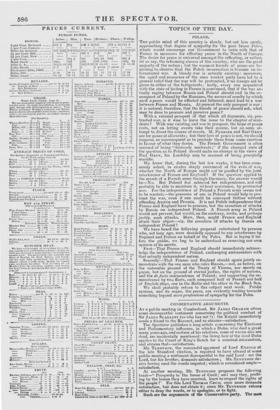TOPICS OF THE DAY.
POLAND.
THE public mind of this country is slowly, but not less surely, approaching that degree of sympathy for the poor brave Poles,
which would encourage our Government to unite with that of France in measures for effecting peace in the North of Europe. The desire for peace is universal amongst the reflecting, or rather, Jet us say, the reforming classes of this country, who are the great majority of the nation ; but the warmest friends of peace are be- ginning to observe that the Polish insurrection is become an in- ternational war. A bloody war is actually existing : moreover, the spirit and resources of the once weaker party have led to a general belief that the war will be protracted, if no foreign aid be given to either of the belligerents : lastly, every one acquainted with the state of feeling in France is convinced, that if the war ac- tually raging between Russia and Poland should end in the re- conquest of Poland by the Russians, the scenes of cruelty by which. such a peace would be effected and followed, must lead to a war between France and Russia. At present the only prospect is war : it is natural, therefore, that the friends of peace should ask, what may be done to procure and preserve peace ? With a rational prospect of that which all deprecate, viz. pro- tracted war, is it wise to leave the issue to the chapter of acci- dents ? With war existing and war in prospect, the hope of peace rests, not on letting events take their course, but on some at- tempt to direct the course of events. M. PERRIER and Earl GREY are for peace at all events ; but their love of peace is not, we should suppose, so inconsequent as to preclude them from some exertion in favour of what they desire. The French Government is often accused of being "furiously moderate ;" if the changed state of the question as to Poland should make no change in the views of Earl GREY, his Lordship may be accused of being peacefully warlike.
We know that, during the last few weeks, it has been com- monly asked, in circles deeply convinced of the evils of war, whether the North of Europe might not be pacified by the joint interference of France and England ? If the question applied to the march of a French army through Germany, the answer would be-No. But Poland has achieved her independence, and will probably be able to maintain it, wiihout assistance, by protracted war. For the independence of Poland a French army seems not to be wanted;-the presence of one in Poland would help to pro- tract the war, even if one could be conveyed thither without offending Austria and Prussia. It is not Polish independence that France and England have to procure, but the cessation of attacks by Russia on independent Poland. A French army in Poland would not prevent, but would, on the contrary, invite, and perhaps justify, such attacks. How, then, might France and England attain their object-viz, the cessation of attacks by Russia on independent Poland?
We have heard the following proposal entertained by persons who, not long ago, were decidedly opposed to any interference by England and France on behalf of the Poles. But in leying it be. fore the public, we beg to be understood as reserving our own opinion of its merits. First-That France and England should immediately acknow- ledge the independence of Poland, exchanging ambassadors with that actually independent nation.
Secondly-That France and England should again jointly re- monstrate with the one man who rules Russia,-not, as before, on the untenable ground of the Treaty of Vienna, nor merely on paper, but on the ground of eternal justice, the rights of nations, . and the de facto independence of Poland; and supporting the re- monstrance by two fleets, each composed half of French and half of English ships, one in the Baltic and the other in the Black Sea. We shall probably return to this subject next week. Public opinion, and its organ, the press, are evidently tending towards something beyond mere professions of sympathy for the Poles.


























 Previous page
Previous page